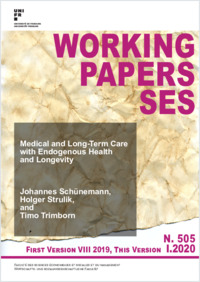Medical and long-term care with endogenous health and longevity
Université de Fribourg BP2-STS
-
01.01.2020
21 p.
English
For the population over 65, long-term care (LTC) expenditure constitutes a considerable share in total health expenditures. In this paper, we distinguish between medical care, intended to improve one›s state of health, and personal care required for daily routine. Personal care can be either carried out autonomously or by a third party. In the course of aging, autonomous personal care is eventually substituted by LTC. We set up a life-cycle model in which individuals are subject to physiological aging, calibrate it with data from gerontology, and analyze the interplay between medical care and LTC. We replicate health behavior and life expectancy of individuals and in particular the empirically observed patterns of medical care and LTC expenditure. We then analyze the impact of better health and rising life expectancy, triggered by rising income and improving medical technology, on the expected cost of LTC in the future. We predict an elasticity of LTC expenditure with respect to life expectancy of 1/3. In terms of present value at age 20, life-time LTC expenditure is predicted to decline with rising life expectancy.
- Collections
- Faculty
- Faculté des sciences économiques et sociales et du management
- Language
-
- English
- Classification
- Economics
- Other electronic version
- Series statement
-
- Working Papers SES ; 505 (revised)
- License
- License undefined
- Identifiers
-
- RERO DOC 328021
- RERO R009006839
- Persistent URL
- https://sonar.ch/global/documents/308356
Statistics
Document views: 196
File downloads:
- WP_SES_505_revised_.pdf: 255
